小学英语六年级总复习语法及练习题(一)
人教版小学六年级总复习英语语法知识最全整理+语法专项训练题

小学英语语法知识最全整理+语法专项训练题一、小学英语语法知识最全整理第一章名词(Noun)名词的概念在生活中,我们会接触到各种各样的人和事物,用来表示这些人或事物名称的词就是名词。
一、名词的数名词的数指名词的单数和复数形式。
可数名词表示“一个”时用单数,“两个以上”时用复数;不可数名词表示量时,通常用“数词+单位+of+物质名词”的形式,如 a piece ofbread (一片面包),变为复数时,只须将单位名词变为复数,如:two pieces of bread(两片面包)。
*名词复数的构成法则1. 一般情况下在词尾加 s. 词尾读音shop --- shops (商店) 在清辅音后读 [ s ]bag --- bags (书包) 在浊辅音后读[ z ]window --- windows (窗户) 在元音后读 [ z ]2. 以 s, x, sh, ch结尾的单词在词尾加es。
class --- classes (班级) 词尾读音[ iz ]box --- boxes (盒子)match --- matches (比赛)brush --- brushes (刷子)3. 以“辅音字母 +y”结尾的词,变y为 i 加es.story --- stories (故事) 词尾读音[ iz ]4. 以“元音字母 +y”结尾的词,在词尾直接加skey --- keys 词尾读音[ z ]monkey --- monkeys5.以“o”结尾的名词,复数一般在词尾加“s”,但个别加“es”tomato --- tomatoes (西红柿) 词尾读音[ z ]potato --- potatoes (土豆)zoo --- zoos (动物园)photo --- photos (照片)*(以“o”结尾,复数加“es”)口诀:黑人(Negro)英雄(hero),左手拿着西红柿(tomato),右手拿着破土豆(potato),头顶一个大芒果(mango)。
小学英语语法总复习练习题
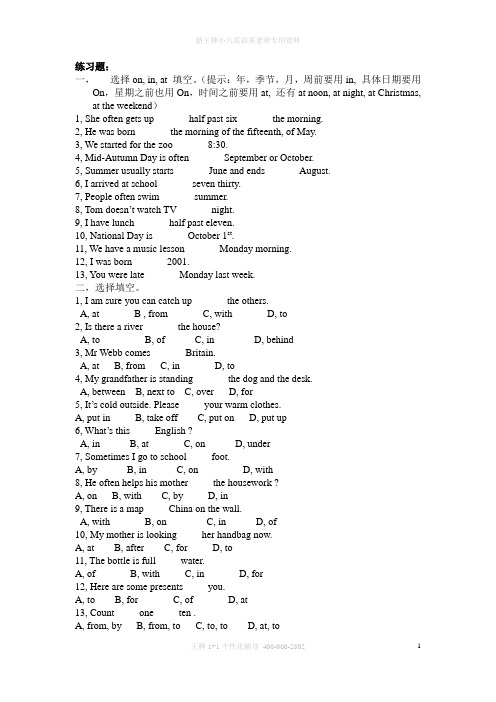
练习题:一,选择on, in, at 填空。
(提示:年,季节,月,周前要用in, 具体日期要用On,星期之前也用On,时间之前要用at, 还有at noon, at night, at Christmas, at the weekend)1, She often gets up ______ half past six ______ the morning.2, He was born ______ the morning of the fifteenth, of May.3, We started for the zoo ______ 8:30.4, Mid-Autumn Day is often ______ September or October.5, Summer usually starts ______ June and ends ______ August.6, I arrived at school ______ seven thirty.7, People often swim ______ summer.8, Tom doesn’t watch TV ______ night.9, I have lunch ______ half past eleven.10, National Day is ______ October 1st.11, We have a music lesson ______ Monday morning.12, I was born ______ 2001.13, You were late ______ Monday last week.二,选择填空。
1, I am sure you can catch up ______ the others.A, at B , from C, with D, to2, Is there a river ______ the house?A, to B, of C, in D, behind3, Mr Webb comes ______ Britain.A, at B, from C, in D, to4, My grandfather is standing ______ the dog and the desk.A, between B, next to C, over D, for5, It’s cold outside. Please ____ your warm clothes.A, put in B, take off C, put on D, put up6, What’s this ____ English ?A, in B, at C, on D, under7, Sometimes I go to school ____ foot.A, by B, in C, on D, with8, He often helps his mother ____ the housework ?A, on B, with C, by D, in9, There is a map ____ China on the wall.A, with B, on C, in D, of10, My mother is looking ____ her handbag now.A, at B, after C, for D, to11, The bottle is full ____ water.A, of B, with C, in D, for12, Here are some presents ____ you.A, to B, for C, of D, at13, Count ____ one ____ ten .A, from, by B, from, to C, to, to D, at, to14, It’s time ____ supper.A, at B, in C, on D, for15, The classroom is quite different ____ that one.A, of B, from C, with D, like16, Go straight ahead, the post office is ____ your right. A, of B, from C, with D, on17, You can come and have dinner ____ us.A, of B, from C, with D, like18, A panda looks ____ a bear.A, of B, from C, with D, like19, Did you hand ____ your homework this morning ?A, of B, from C, with D, in20, I painted a picture ____ horses.A, of B, from C, with D, in三,用正确的介词填空。
小学英语总复习--语法每日一练II

小学英语总复习题----语法每日一练II(一)( )1.He is now living in ______ European country.A. aB. anC. /D. any( )2. China is ______ old country with ______ long history.A. an, aB. a, aC. an, theD. an, an( )3. My parents usually go out for ______ walk in ______ evening.A. the, aB. a, theC. /, theD. a, an( )4. Her ______ second thing is to do her homework.A. aB. anC. theD./( )5. The word “flower” begins with ______ “f” and the end with ______ “r”.A. a, aB. an, anC. an, aD. an,a( )6. June 1st is ______ Children’s Day.A. aB. anC. theD./( )7. ______ Huanghe River is _______ second largest river in China.A. The, theB. A, aC. The, aD. A, the( )8. Paris is one of ______ most beautiful cities in ______ world.A. /, theB. /,/C. the, theD. the, /( )9. Last Sunday he went to ______ Great Wall at ______ noon.A. the, theB. /,/C. the, theD. the, /( )10. We always have ______ rice for ______ lunch.A. /,/B. the, /C. /,aD. the, the( )11. There is no room for ______.A. us twoB. we twoC. two usD. two of we( )12. ______ of the work has been done.A. Two thirdB. Two threeC. Two thirdsD. Two third小学英语总复习题----语法每日一练II(二)( )1.I will tell him as soon as he _____ backA. comeB. comesC. will comeD. came( )2. Mary _____ on shoes when she ____ them.A. tries…buysB. tries… buiesC. trys… buysD. trys… buies ( )3. The girl often ______ cold when she ______.A. catches…dancesB. catches… dancesC. catchs…danceesD. catches… dancee( )4. _____ he ____ himself there? No, I don't think so.A. Do…enjoyB. Does…enjoiesC. Does…enjoysD. Does…enjoy ( )5. _____ your teacher ____ from them very often? Certainly.A. Do…hearB. Does…hearC. Do… receiveD. receive ( )6. _____ your mother _____ some cleaning on Sundays? A. Does…does B. Do…does C. Does…do D. Do… do( )7. _____ Tom _____to work hard to help his family ? Yes, he _____.A. Has… x…doesB. Has…x…doesC. Does…has…hasD. Does… have…does( )8. Which teacher _____ lessons to you every day ?A. does …givesB. does… giveC. do… giveD. gives( )9. Smith does not go fishing on weekdays, ____? _____ , he does.A. does he…NoB. does he…YesC. doesn't he…NoD. doesn't he…Yes( )10.Mr Black often _____ fishing on Sundays, _____ he ? A. goes…doesn't B. goes…isn'tC. doesn't go…doesD. doesn't go…is( )1.He usually _____ TV on Sunday evening.A. watchB. watchesC. watchingD. is watching( )2. We'll go to play with snow if it ______ tomorrow.A. snowB. snowsC. will snowD. snowed( )3. Neither I nor he ______ French.A. speakB. doesn't speakC. speaksD. doesn't speak ( )4. Nobody ______ how to run this machines.A . know B. have known C. knows D. is knowing( )5. The Young Pioneer _____ water for the old man every day.A. carryB. bringC. takesD. carries( )6. Some are ______ in the river and some are ______ games.A. swimming… playingB. swimming…plaiingC. swimming… I playingD. swimming…plaing( )7. Look ! The boy students are _____ football while the girls are _____ .A. playing… danceB. playing… dancingC. play… dancingD. play… dance( )8. He _____ to do his lessons at eight every evening.A. is beginningB. is beginningC. beginD. begins( )9. _____ he _____ on well with his friends this term ?A. Does…getsB. Does…getC. Is…gettingD. Is…geting ( )10. Mr Smith _____ short stories, but he ____ a TV play these days.A. is writing…is writingB. is writing… writesC. writes… is writingD. writes… writes( )1. This company was the first ____ portable radios as well as cassette tape recorders in the world.A. producingB. to produceC. having producedD. produced ( )2. The purpose of new technology is to make life easier, ____it more difficult.A .not makingB. not make C .not to make D. nor to make ( )3. Helen had to shout ______above the sound of the music .A .making herself hearB. to make herself hearC. making herself heardD .to make herself heard( )4. I don’t know whether you happen_______ ,but I am going to study in the U.S.A this September。
六年级课程复习语法练习题

六年级课程复习语法练习题一、选择题1. Please turn off the lights ______ leaving the room.A. whenB. whileC. sinceD. if2. My sister _______ to the supermarket and bought some fruits yesterday.A. goB. goesC. goingD. went3. Tim ________ a new bike as his birthday present next month.A. getsB. getC. gotD. getting4. The teacher asked us _________ in the library.A. not talkB. don't talkC. to not talkD. not to talk5. _______ you ever _______ to the Great Wall?A. Did, goneB. Have, goneC. Do, wentD. Have, been6. Could you please ________ the window? It's too hot in the room.A. openB. openedC. openingD. opens7. The children _________ basketball in the playground at the moment.A. playB. are playingC. playedD. plays8. Linda _________ her homework yet. She is still doing it.A. didn't finishB. hasn't finishedC. doesn't finishD. hasn't finish9. My father _________ in a hospital. He is a doctor.A. worksB. workC. workedD. working10. _______ he _______ to the park every Sunday?A. Do, goB. Does, goC. Do, goesD. Does, goes二、用括号内所给词的适当形式填空1. My brother ___________ (come) back from school at 4:30 yesterday.2. There ___________ (be) some milk in the fridge.3. Look! The babies ___________ (sleep) in the crib.4. They ___________ (not visit) the museum last week.5. Peter and I ___________ (have) lunch at the restaurant now.6. My sister often ___________ (watch) TV after dinner.7. Mary ___________ (not eat) any sweets last night.8. Yesterday, we ___________ (play) soccer in the park.9. The students ___________ (not study) English tomorrow.10. Tom and his friends ___________ (ride) their bikes in the park.三、按要求改写句子1. We can not go out when it rains. (改为反义疑问句)_______ _______ go out when it rains, _______ _______?2. Tony can swim well. (改为否定句)Tony _______ _______ well.3. The students are playing basketball in the gym. (改为一般疑问句) _______ the students _______ basketball in the gym?4. I have done my homework. (对划线部分提问)_______ _______ you _______?5. They will visit the museum tomorrow. (改为否定句)They _______ _______ to the museum tomorrow.四、根据中文提示翻译成英文句子1. 昨天我和我的朋友们一起踢足球。
(完整)小学英语六年级总复习语法及练习题(一).docx
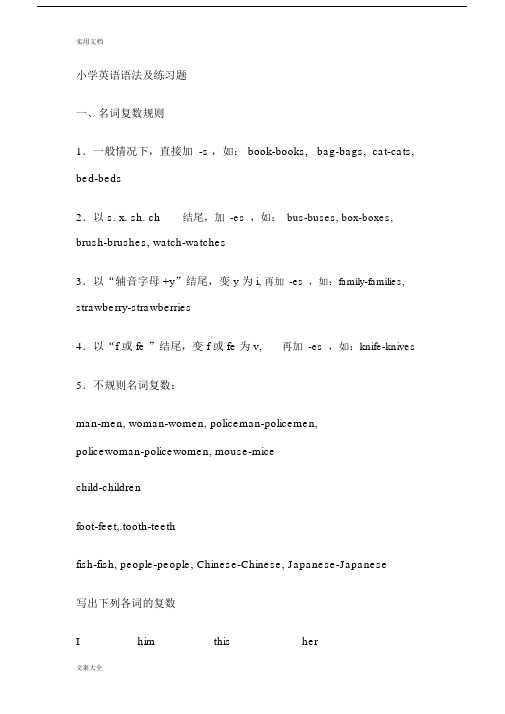
小学英语语法及练习题一、名词复数规则1.一般情况下,直接加 -s ,如: book-books, bag-bags, cat-cats, bed-beds2.以 s. x. sh. ch结尾,加-es,如:bus-buses, box-boxes, brush-brushes, watch-watches3.以“辅音字母 +y”结尾,变 y 为 i,再加-es,如:family-families, strawberry-strawberries4.以“f 或 fe ”结尾,变 f 或 fe 为 v,再加-es,如:knife-knives 5.不规则名词复数:man-men, woman-women, policeman-policemen,policewoman-policewomen, mouse-micechild-childrenfoot-feet,.tooth-teethfish-fish, people-people, Chinese-Chinese, Japanese-Japanese写出下列各词的复数I _________him _________this ___________her ______watch _______child _______photo ________diary ______day________ foot________ book_______ dress ________tooth_______ sheep ______box_______ strawberry _____thief _______yo-yo ______ peach______ sandwich ______man______ woman_______ paper_______juice___________ water________ milk________ rice__________ tea__________二、一般现在时一般现在时基本用法介绍【No. 1 】一般现在时的功能1. 表示事物或人物的特征、状态。
名词的单数复数所有格(讲义)通用版英语六年级下册

小学英语语法知识总复习(一)名词的单数、复数、所有格(一)可数名词复数的构成1.一般情况,在单数名词后面加s构成。
如:game→_______ , boy→_______2.以s , x , sh , ch 结尾的单数名词变复数,在词尾加es构成。
如:box→_________ , bus→________ , dish→_______peach→________3.以o结尾,表示有生命的事物的单数名词变复数加es;表示没有生命的事物的单数名词变复数加s。
如:potato→_________ , tomato→________ ;photo→__________ , piano→__________4.以辅音字母加y结尾的单数名词变复数,将y改成i后再加es。
如:factory→__________ , story→_________ , family→__________ 等。
5.以f或fe结尾的单数名词变复数,将f或fe改成v,然后再加es 。
如:leaf→________ , life →________ , knife→__________ 等。
(二)不规则名词复数:footfeet脚 toothteeth 牙齿 goosegeese鹅 manmen男人womanwomen女人 childchildren孩子 mousemice老鼠 oxoxen公牛Japanese—Japanese 日本人ChineseChinese中国人deerdeer鹿 sheepsheep绵羊 fishfish鱼(三)不可数名词量的表示不可数名词没有单数、复数之分。
如:a ____ of tea , a _____ of milk , a _______ of paper 等。
如果为了表示“多个”的概念,就将表示这些东西的单位变成复数。
如:a can of cola→ six ________ of cola ,a loaf of bread→ten ______ of bread 等。
牛津小学英语六年级上册1-4单元总复习知识点和练习

6AUnit 1重点短语long long ago很久以前make sth for sb为某人制作...... show sb. sth.= show sth. to sb把.某物展示给某人看walk through 步行穿过 try on试穿shout at sb.对某人大叫laugh at sb.对某人大笑look at看⋯.point at指向⋯tell sb. sth告.诉某人某事 it is one’ s turn某人的机会in front of在⋯.前面(外部)turn into变成in the front of在⋯ 前面(内部)think hard努力思考be nice to sb.对某人好句型1.Long long ago, there was a king. 很久很久以前,有一位国王。
2.The king was happy. 国王很开心。
3.He liked new clothes. 他喜欢新衣服。
4.Two men visited the king. 两个男人拜访了这位国王。
语法1.掌握动词过去式的变化规则2.there be句型的过去时句型转换语音1.考查字母组合 ar 发音3.考查动词的过去式 ed 的发音Unit 1 错题集精选一、找出与所给单词的划线部分读音相同的选项。
()1. farm A. ear B. quarter C. hard()2. walked A. looked B. played C. shoutedht二、单项选择( ( ( ( ()1. I ________ TV a moment ago.A. watchB. watchedC. looked)2. Tom ________ the farm _______ his family yesterday.A. visit, withB. visited, forC. visited, and)3. It ’s seven o’clock. David has to ________.A. go to schoolB. going to schoolC. went to schoolD. goes to school)4. Each student one picture.A. drawB. drawsC. drawing)5. She usually _______ new clothes his doll.D. lookD. visited, withD. to drawing( ( ( ( (A. makes, withB. make , forC. makes, forD. make, with)6. The lion always walks ______ the forest every day.A. onB. underC. throughD. behind)7. The witch( 女巫 ) the prince a lion.A. turned , onB. talked, with ,C. told , aboutD. turned ,into )8. The clothes are beautiful. Please ______________.A. try it onB. try on themC. try them onD. try on it)9. The shoes are very cool, but they me.A. are fittingB. fitC. don’tfitD. fitted)10. Yesterday Nancy was sick, her mother her carefully.A. looked afterB. looked atC. looked forD. looked out三、句型转换1. The two men showed the king his new clothes.(同义句转换)The two men his new clothes the king.2. There were some apples in the street. (改为否定句)There _________ _________ apples in the street.3. My uncle lives in a big city.(用two years ago改写)My uncle ________ in a big city two years ago.答案:一1.C2.A解析:清辅音 +ed,发 /t/; 浊辅音或元音 +ed,发 /d/; t+ed, 发 /id/二1.B解析:出现 ago,所以用过去时,看电视应该用watch2.D解析:出现 yesterday 用过去时, with 表示“和” ,放在句末3.A解析: have to 中 to 后面用动词原形4.B解析: each 后接单数可数名词,且谓语动词用单数5.C解析: usually 用一般现在时,主语为第三人称单数,所以用三单式;make sth for sb6.C解析:考查方位介词,“穿过森林”应该用through;7.D解析: turn sb into ... 固定短语8.C解析: try on 表示“试穿” ,后接代词用宾格,且放在中间9.C解析:根据 but 这一转折,所以要用否定,fit 的否定要用助动词do10.C 解析: look 的短语, look after 照顾, looked at 看 ......, looked for 寻找, looked out向外看三1.showed to 解析:考查 show 的短语2.weren’t any 解析:考查一般过去时的否定句转化3.lived 解析:考查动词的过去式Unit 2重点短语by bike 骑自行车look sad 看起来伤心hold on抓紧fly away飞走= ride a bike骑自行车on Monday morning在星期一早上难点:表示天气的名词与相应的形容词转化rain( 名词 )rainy(形容词)rain( 动词 )句型1. It was sunny / cloudy/ windy. 天气是晴朗的/ 多云的 / 有风的。
牛津小学英语六年级上册1-4单元总复习知识点和练习

6AUnit1重点短语longlongago很久以前makesthforsb为某人制作...... showsb.sth.=showsth.tosb把.某物展示给某人看walkthrough步行穿过tryon试穿shoutatsb.对某人大叫laughatsb.对某人大笑lookat看⋯.pointat指向⋯tellsb.sth告.诉某人某事itisone’sturn某人的机会infrontof在⋯.前面(外部)turninto变成inthefrontof在⋯前面(内部)thinkhard努力思考benicetosb.对某人好句型1.Longlongago,therewasaking.很久很久以前,有一位国王。
2.Thekingwashappy.国王很开心。
3.Helikednewclothes.他喜欢新衣服。
4.Twomenvisitedtheking.两个男人拜访了这位国王。
语法1.掌握动词过去式的变化规则2.therebe 句型的过去时句型转换语音1.考查字母组合ar发音3.考查动词的过去式ed的发音Unit1错题集精选一、找出与所给单词的划线部分读音相同的选项。
( )1.farm A.ear B.quarter C.hard( )2.walked A.lookedB.playedC.shoutedht二、单项选择( ( ( ( ( )1.I________TVamomentago.A.watchB.watchedC.looked)2.Tom________thefarm_______hisfamilyyesterday.A.visit,withB.visited,forC.visited,and)3.It’sseveno’clock.Davidhasto________.A.gotoschoolB.goingtoschoolC.wenttoschoolD.goestoschool)4.Eachstudent onepicture.A.drawB.drawsC.drawing)5.Sheusually_______newclotheshisdoll.D.lookD.visite d,withD.todrawi ng( ( ( ( (A.makes, withB.make, forC.makes, forD.make, with)6.Thelionalwayswalks______theforesteveryday.A.onB.underC.throughD.behind)7.Thewitch(女巫) theprince alion.A.turned, onB.talked, with,C.told, aboutD.turned, into )8.Theclothesarebeautiful.Please______________.A.tryitonB.tryonthemC.trythemonD.tryonit)9.Theshoesareverycool,butthey me.A.arefittingB.fitC.don’tfitD.fitted)10.YesterdayNancywassick,hermother hercarefully.A.lookedafterB.lookedatC.lookedforD.lookedout三、句型转换1.Thetwomenshowedthekinghisnewclothes. (同义句转换)Thetwomen hisnewclothestheking.2.Thereweresomeapplesinthestreet.(改为否定句)There__________________applesinthestreet.3.Myunclelivesinabigcity. (用twoyearsago改写)Myuncle________inabigcitytwoyearsago.答案:一1.C2.A解析:清辅音+ed,发/t/;浊辅音或元音+ed,发/d/;t+ed,发/id/二1.B 解析:出现ago,所以用过去时,看电视应该用watch2.D解析:出现yesterday用过去时,with表示“和”,放在句末3.A解析:haveto中to后面用动词原形4.B解析:each后接单数可数名词,且谓语动词用单数5.C 解析:usually用一般现在时,主语为第三人称单数,所以用三单式;makesthforsb6.C解析:考查方位介词,“穿过森林”应该用through;7.D解析:turnsbinto...固定短语8.C解析:tryon表示“试穿”,后接代词用宾格,且放在中间9.C解析:根据but这一转折,所以要用否定,fit的否定要用助动词do10.C解析:look的短语,lookafter照顾,lookedat看......,lookedfor寻找,lookedout 向外看三1.s howedto解析:考查show的短语2.w eren’tany解析:考查一般过去时的否定句转化3.l ived解析:考查动词的过去式Unit2重点短语 bybike 骑自行车= rideabike骑自行车looksad 看起来伤心抓紧飞走 onMondaymorning在星期一早上难点:表示天气的名词与相应的形容词转化rain(名词)rainy (形容词)rain(动词)句型1.Itwassunny/cloudy/windy.天气是晴朗的 /多云的/有风的。
陕旅版小学六年级英语总复习之语法完整版

陕旅版小学六年级英语总复习之语法HEN system office room 【HEN16H-HENS2AHENS8Q8-HENH1688】小学英语语法及习题一、名词复数规则1.一般情况下,直接加-s,如:book-books, bag-bags, cat-cats, bed-beds 2.以s. x. sh. ch结尾,加-es,如:bus-buses, box-boxes, brush-brushes, watch-watches3.以“辅音字母+y”结尾,变y为i,再加-es,如:family-families, strawberry-strawberries4.以“f或fe”结尾,变f或fe为v, 再加-es,如:knife-knives5.不规则名词复数:man-men, woman-women, policeman-policemen, policewoman-policewomen, mouse-micechild-childrenfoot-feet,.tooth-teethfish-fish, people-people, Chinese-Chinese, Japanese-Japanese写出下列各词的复数I _________him _________this___________her ______watch _______child _______photo________diary ______day________ foot________book_______ dress ________tooth_______ sheep ______box_______ strawberry _____thief _______yo-yo ______peach______ sandwich ______man______ woman_______ paper_______ juice___________water________ milk________rice__________ tea__________二、一般现在时一般现在时基本用法介绍【No. 1】一般现在时的功能1.表示事物或人物的特征、状态。
(完整)小学英语六年级总复习语法及练习题(一)
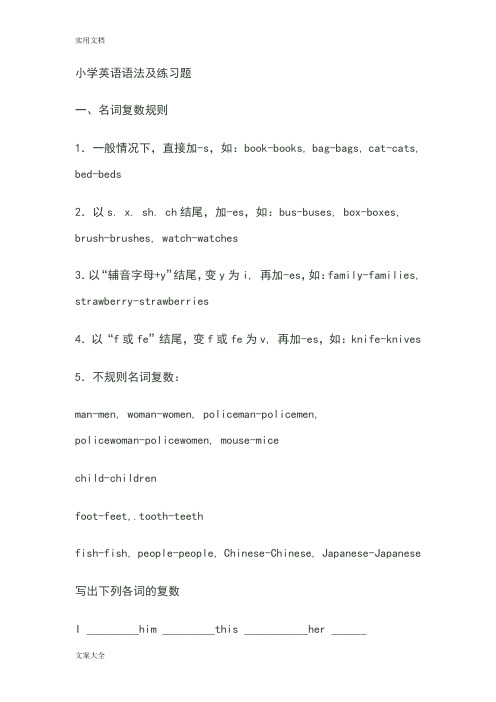
小学英语语法及练习题一、名词复数规则1.一般情况下,直接加-s,如:book-books, bag-bags, cat-cats, bed-beds2.以s. x. sh. ch结尾,加-es,如:bus-buses, box-boxes, brush-brushes, watch-watches3.以“辅音字母+y”结尾,变y为i, 再加-es,如:family-families, strawberry-strawberries4.以“f或fe”结尾,变f或fe为v, 再加-es,如:knife-knives 5.不规则名词复数:man-men, woman-women, policeman-policemen,policewoman-policewomen, mouse-micechild-childrenfoot-feet,.tooth-teethfish-fish, people-people, Chinese-Chinese, Japanese-Japanese 写出下列各词的复数I _________him _________this ___________her ______watch _______child _______photo ________diary ______day________ foot________ book_______ dress ________tooth_______ sheep ______box_______ strawberry _____thief _______yo-yo ______ peach______ sandwich ______man______ woman_______ paper_______ juice___________ water________ milk________ rice__________ tea__________ 二、一般现在时一般现在时基本用法介绍【No. 1】一般现在时的功能1.表示事物或人物的特征、状态。
(完整版)人教版(PEP)小学英语六年级上册复习资料
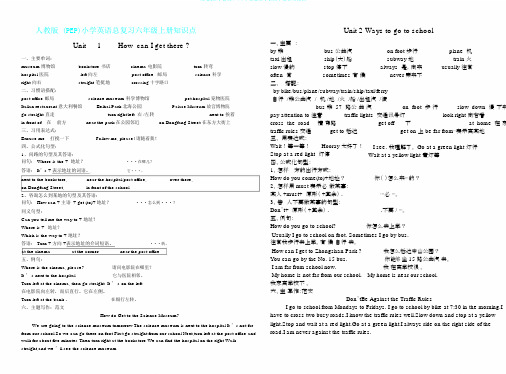
人教版 (PEP)小学英语总复习六年级上册知识点Unit1How can I get there ?一、主要单词:museum 博物馆bookstore 书店cinema 电影院turn 转弯hospital 医院left 向左post office邮局science 科学right 向右straight 笔挺地crossing 十字路口二、习惯语搭配:post office 邮局science museum 科学博物馆pet hospital 宠物医院Italian restaurant 意大利餐馆Beihai Park 北海公园Palace Museum 故宫博物院go straight 直走turn right/left 右 /左转next to 挨着in front of... 在 ...前方near the park 在公园邻近on Dongfang Street 在东方大街上三、习用表达式:Unit 2 Ways to go to school一、主要:by 乘bus 公共汽on foot 步行plane 机taxi 出租ship(大)船subway 地train 火slow 慢的stop 停下always 是,向来usually 往常often 常sometimes 有候never 素来不二、搭配:by bike/bus/plane/subway/train/ship/taxi/ferry自行 /乘公共汽 / 机 /地 /火 /船 /出租汽 /渡bus 乘 57 路公共汽on foot 步行slow down 慢下来pay attention to 注意traffic lights 交通讯号灯look right 向右看cross the road横穿路get off下at home 在家traffic rules 交通get to 抵达get on 上be far from⋯表示离某地Excuse me打搅一下Follow me, please! 请随着我!四、公式化句型:1、问路的句型及其答语:问句: Where is the + 地址?···在哪儿?答语: It’s + 表示地址的词语。
小学英语六年级总复习四种十时态的结构和标志词语法讲解及基础练习
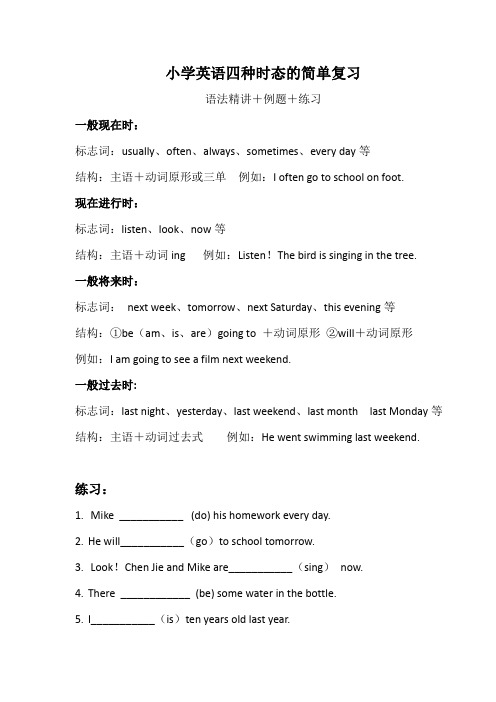
小学英语四种时态的简单复习语法精讲+例题+练习一般现在时:标志词:usually、often、always、sometimes、every day等结构:主语+动词原形或三单例如:I often go to school on foot.现在进行时:标志词:listen、look、now等结构:主语+动词ing 例如:Listen!The bird is singing in the tree.一般将来时:标志词:next week、tomorrow、next Saturday、this evening等结构:①be(am、is、are)going to +动词原形②will+动词原形例如:I am going to see a film next weekend.一般过去时:标志词:last night、yesterday、last weekend、last month last Monday等结构:主语+动词过去式例如:He went swimming last weekend.练习:1. Mike ___________ (do) his homework every day.2.He will___________(go)to school tomorrow.3. Look!Chen Jie and Mike are___________(sing)now.4.There ____________ (be) some water in the bottle.5.I___________(is)ten years old last year.6. We like ____________ (play) basketball after class.7.He___________(ride)a bike with his friend next week.8.My brother is___________(make)kites.9.They___________(do)their homework yesterday.10.We___________(take)a trip over the summer holiday.11. I like singing. I often ____________ (listen) to the music in the evening.12. My grandma ___________ (watch) TV every day.13.Mike didn’t___________(see)a film last night.14.What______you ______ ______ ______ (do)next Saturday.15.Is he___________(watch)TV ?Yes,they are.。
小学英语(1-6年级)语法总结及练习题
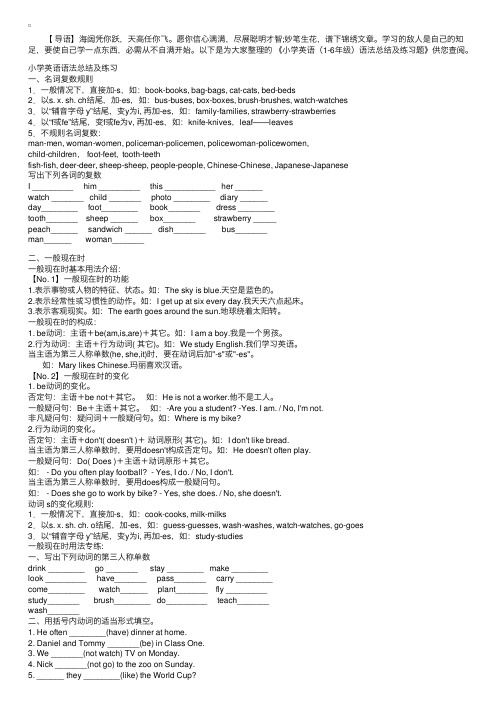
【导语】海阔凭你跃,天⾼任你飞。
愿你信⼼满满,尽展聪明才智;妙笔⽣花,谱下锦绣⽂章。
学习的敌⼈是⾃⼰的知⾜,要使⾃⼰学⼀点东西,必需从不⾃满开始。
以下是为⼤家整理的《⼩学英语(1-6年级)语法总结及练习题》供您查阅。
⼩学英语语法总结及练习⼀、名词复数规则1.⼀般情况下,直接加-s,如:book-books, bag-bags, cat-cats, bed-beds2.以s. x. sh. ch结尾,加-es,如:bus-buses, box-boxes, brush-brushes, watch-watches3.以“辅⾳字母 y”结尾,变y为i, 再加-es,如:family-families, strawberry-strawberries4.以“f或fe”结尾,变f或fe为v, 再加-es,如:knife-knives,leaf——leaves5.不规则名词复数:man-men, woman-women, policeman-policemen, policewoman-policewomen,child-children, foot-feet, tooth-teethfish-fish, deer-deer, sheep-sheep, people-people, Chinese-Chinese, Japanese-Japanese写出下列各词的复数I _________ him _________ this ___________ her ______watch _______ child _______ photo ________ diary ______day________ foot________ book_______ dress ________tooth_______ sheep ______ box_______ strawberry _____peach______ sandwich ______ dish_______ bus_______man______ woman_______⼆、⼀般现在时⼀般现在时基本⽤法介绍:【No. 1】⼀般现在时的功能1.表⽰事物或⼈物的特征、状态。
小学英语语法--六年级毕业复习练习题(1)
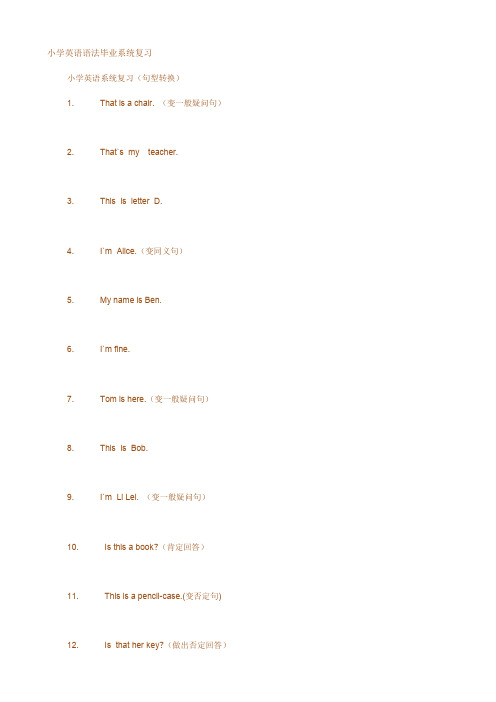
小学英语语法毕业系统复习小学英语系统复习(句型转换)1. That is a chair. (变一般疑问句)2. That`s my teacher.3. This is letter D.4. I`m Alice.(变同义句)5. My name is Ben.6. I`m fine.7. Tom is here.(变一般疑问句)8. This is Bob.9. I`m Li Lei. (变一般疑问句)10. Is this a book?(肯定回答)11. This is a pencil-case.(变否定句)12. Is that her key?(做出否定回答)13. This is a pen in English.14. It is an English book.15. This is my book.(复数).16. Is that a cat.(复数)17. Is that a cat?主(变复数)18. His baseball is under the table. (变一般疑问句)19. I go to school by bike.20. I often go hiking on the weekend. (变一般疑问句)21. She is drawing a picture now.22. Is the cat eating fish?(肯定回答)23. I went to guangzhou last week.24. Jim planted trees yeeterday.25. It was sunny yesterday.(变否定句)26. The apples are five yuan.27. There is a T-shirt in the box.(变复数句)28. My mem cleans the room every day.(变否定句)29. Peter is going to fly a kite next Sunday.30. My bag is red.31. This shirt is very nice.(变为否定句)32. What`s the matter?(变同义句)33. Tom is tall,but denny is short.(改为比较句)34. He goes to work by bike.35. We are going to go hiking this Friday.36. I like white best.37. We are going to shanghai38. She is washing the clothes.39. The pens are in the pencil-case.40. He`s going to the Great Wall.(变否定句)41. It is an elephant.42. Miss Xu is a good teacher. (变一般疑问句,肯定回答)43. It`s our flag.44. The young girl is my sister.45. My name is Alice.46. She didn`t do homework yesterday.(变为肯定句)47. I`m from China.48. Tom is cleaning the classroom. (变一般疑问句)49. She often washes the clothes. (变一般疑问句)50. These are maps.(变为单数)51. This is a beautiful bee.52. Is there a book in the deak?(变成复数句)53. There are four chairs in the dinning room.54. Can you play football?(否定回答)55. Xiao ming likes drawing. (变一般疑问句,否定回答)56. My mother works in a hospital.57. Ma Na`s uncle live in beijing.58. They walk in the street every evening.59. I often go swimming on Sundays.60. Mark doesn`t like playing the piano.61. Is your father going to see your uncle?(变肯定句)62. The children are going to the zoo next weekend.63. I did my homework yesterday evening.64. Miss Li saw the boy this morning.(变一般疑问句)65. Lily ang Lucy went ice_skating yesterday.66. It`s seven o`clock.67. I can see three pencils in the pencil-case.小学英语系统总复习(代词)一、写出下列单词的正确形式:宾格形容词性物主代词名词性物主代词I ————————————————you ————————————————he ————————————————she ————————————————it ————————————————we ————————————————they ————————————————二、根据汉语提示,用人称代词的适当形式填空:1.————(我) am a teacher .2. ————(她) is eleven years old.3. ————(他) studies in NO.1 primary School.4.————(我们) have English ,mach, Chinese today.5.________ (它) is a map of China.6.Mr Brown help ________(我)wash the car.7. I saw ________ (你) in the bookstore yesterday.8. Please give_________ (他) an English book.9.The blue bike is ____________(我的)。
PEP小学六年级英语下册复习语法知识及配套习题
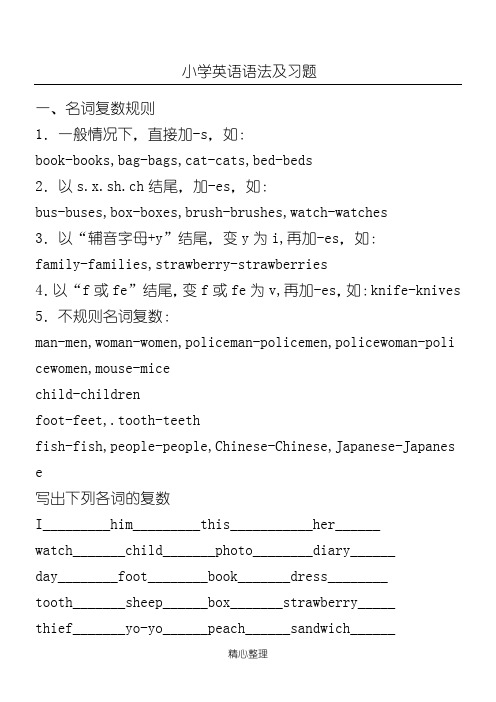
小学英语语法及习题一、名词复数规则1.一般情况下,直接加-s,如:book-books,bag-bags,cat-cats,bed-beds2.以s.x.sh.ch结尾,加-es,如:3.以4.以5eI_________him_________this___________her______ watch_______child_______photo________diary______ day________foot________book_______dress________ tooth_______sheep______box_______strawberry_____ thief_______yo-yo______peach______sandwich______man______woman_______paper_______??????juice___________ water________milk________rice__________tea__________ 二、一般现在时一般现在时基本用法介绍【No.1】一般现在时的功能或"-es"一般现在时的变化1.be动词的变化。
否定句:主语+be+not+其它。
如:Heisnotaworker.他不是工人。
一般疑问句:Be+主语+其它。
如:-Areyouastudent?-Yes.Iam./No,I'mnot.特殊疑问句:疑问词+一般疑问句。
如:Whereismybike?2.行为动词的变化。
否定句:主语+don't(doesn't)+动词原形(+其它)。
如:动词12.以s.x.sh.ch.o结尾,加-es,如:guess-guesses,wash-washes,watch-watches,go-goes3.以“辅音字母+y”结尾,变y为i,再加-es,如:study-studies 一般现在时用法专练:一、写出下列动词的第三人称单数drink________go_______stay________make________look_________have_______pass_______????carry____ come________?????watch______plant_______fly________ study_______brush________do_________????teach_______ 二、用括号内动词的适当形式填空。
小学英语六年级语法训练

小学英语六年级语法训练-1 be动词Be 动词的用法:(1) Am--was Is --was Are--were 口诀:我用am, 你用are, is用在他她它,复数全用are。
(2) 肯定和否定句I am (not) from London. He is(not) a teacher.She is(not) in the dining room. My hair is(not) long. Her eyes are(not) small.(3) 一般疑问句Am I a Chi nese? Yes, you are. No, you aren’t.Are they American? Yes, they are. No, they aren’t.Is the cat fat? Yes, it is. No, it isn’t.用恰当的be动词填空。
1.I ______ a boy. ______ you a boy? No, I _____ not.2. The girl______ Jack's sister.3. The dog _______ tall and fat.4. The man with big eyes _______ a teacher.5. ______ your brother in the classroom?6. Where _____ your mother?She ______ at home.7. How _______ your father?8. Mike and Liu Tao ______ at school.9. Whose dress ______ this?10. Whose socks ______ they?11. That ______ my red skirt.12. Who ______ I?13.The jeans ______ on the desk.14. Here ______ a scarf for you.15. Here ______ some sweaters for you. 16. The black gloves ______ for Su Yang.17. This pair of gloves ______ for Yang Ling.18. The two cups of milk _____ for me.19. Some tea ______ in the glass.20. Gao shan's shirt _______ over there.21. My sister's name ______Nancy.22. This ______ not Wang Fang's pencil.23. ______ David and Helen from England?24. There ______ a girl in the room.25. There ______ some apples on the tree.26. _______ there any kites in the classroom?27. _______ there any apple juice in the bottle?28. There _______ some bread on the plate.29. There _______ a boy, two girls, three men and ten women in the park.30. You, he and I ______ from China.2 人称代词和物主代词人称代词和物主代词1.人称代词主格和宾格的区别:主格通常位于句中第一个动词之前(有时候位于than 之后),宾格一般位于动词或介词之后。
六年级(上册)英语重点单词、重点句子总复习试题
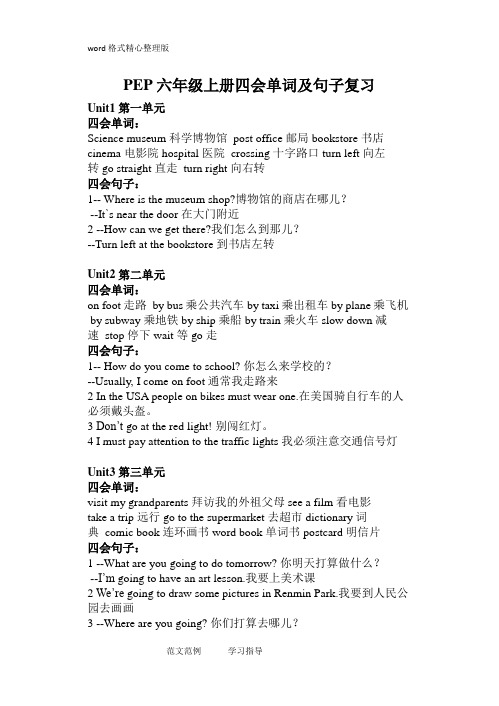
PEP六年级上册四会单词及句子复习Unit1 第一单元四会单词:Science museum科学博物馆 post office邮局 bookstore书店cinema电影院 hospital医院 crossing十字路口 turn left向左转 go straight直走 turn right向右转四会句子:1-- Where is the museum shop?博物馆的商店在哪儿?--It`s near the door在大门附近2 --How can we get there?我们怎么到那儿?--Turn left at the bookstore到书店左转Unit2 第二单元四会单词:on foot走路 by bus乘公共汽车 by taxi乘出租车 by plane乘飞机 by subway乘地铁 by ship乘船 by train乘火车 slow down减速 stop停下 wait等 go走四会句子:1-- How do you come to school? 你怎么来学校的?--Usually, I come on foot通常我走路来2 In the USA people on bikes must wear one.在美国骑自行车的人必须戴头盔。
3 Don’t go at the red light! 别闯红灯。
4 I must pay attention to the traffic lights我必须注意交通信号灯Unit3第三单元四会单词:visit my grandparents拜访我的外祖父母 see a film看电影take a trip远行 go to the supermarket去超市 dictionary词典 comic book连环画书 word book单词书 postcard明信片四会句子:1 --What are you going to do tomorrow? 你明天打算做什么?--I’m going to have an art lesson.我要上美术课2 We’re going to draw some pictures in Renmin Park.我要到人民公园去画画3 --Where are you going? 你们打算去哪儿?--We`re going to the cinema我们打算去电影院4 When are you going? 你们什么时候去?Unit4 第四单元四会单词:dancing跳舞 singing唱歌 reading stories看故事书 playing football 踢足球doing kung fu打功夫 cooks Chinese food做中国菜 studies Chinese 学习汉语 does word puzzles猜字谜 goes hiking远足四会句子:1 --What are Peter `s hobbies? 彼得有什么爱好? --He likes reading stories他喜欢读故事2 --Does he live in Sydney? 他住在悉尼吗? --No, he doesn`t不,他没有3 --Does he like doing word puzzles and going hiking? 他喜欢猜字谜和远足吗?--Yes, he does是的,他喜欢Unit5第五单元四会单词:factory worker工厂工人 postman邮递员 businessman生意人police officer警察 fisherman渔民 scientist科学家 pilot飞行员coach教练四会句子:1 --What does he do? 他是做什么的?--He is a businessman.他是商人2--Where does he work? 他在哪儿工作?-- He works at sea. 他在海上工作。
pep小学英语六年级上册期末总复习--单词+句型+语法练习
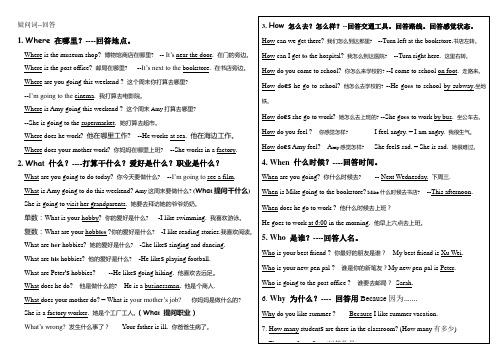
1.Where 在哪里?----回答地点。
Where is the museum shop? 博物馆商店在哪里? -- It’s near the door. 在门的旁边。
Where is the post office? 邮局在哪里? --It’s next to the bookstore. 在书店旁边。
Where are you going this weekend ? 这个周末你打算去哪里?--I’m going to the cinema. 我打算去电影院。
Where is Amy going this weekend ? 这个周末Amy打算去哪里?--She is going to the supermarket. 她打算去超市。
Where does he work? 他在哪里工作? --He works at sea. 他在海边工作。
Where does your mother work? 你妈妈在哪里上班?--She works in a factory.2. Wha t 什么?----打算干什么?爱好是什么?职业是什么?What are you going to do today? 你今天要做什么?--I’m going to see a film. What is Amy going to do this weekend? Amy这周末要做什么? (Wha t提问干什么) She is going to visit her grandparents. 她要去拜访她的爷爷奶奶。
单数:What is your hobby? 你的爱好是什么? -I like swimming. 我喜欢游泳。
复数:What are your hobb ies ?你的爱好是什么? -I like reading stories.我喜欢阅读。
What are her hobbies? 她的爱好是什么? -She like s singing and dancing.What are his hobbies? 他的爱好是什么?-He like s playing football.What are Peter’s hobbies? --He like s going hiking. 他喜欢去远足。
小学英语语法练习题及答案

小学英语语法练习题及答案小学英语语法练习题及答案【篇一:小学英语语法及练习题--名词】定义名词可以分为专有名词和普通名词,专有名词是某个(些)人,地方,机构等专有的名称,如beijing,china等。
普通名词是一类人或东西或是一个抽象概念的名词,如:book,sadness等。
普通名词又可分为下面四类:1)个体名词:表示某类人或东西中的个体,如:gun。
2)集体名词:表示若干个个体组成的集合体,如:family。
4)抽象名词:表示动作、状态、品质、感情等抽象概念,如:work。
个体名词和集体名词可以用数目来计算,称为可数名词,物质名词和抽象名词一般无法用数目计算,称为不可数名词。
2. 名词复数的规则变化(情况,构成方法,读音,例词)a. 一般情况在名词后加-s清辅音后读/s/map-maps浊辅音和元音后读 /z/bag-bags /car-carsb. 以s, sh, ch, x等结尾的名词加-es读 /iz/bus-buses/ watch-watches/brush-brushes/box-boxesc. 以ce, se, ze,等结尾加 -s读 /iz/license-licensesd. 以辅音字母+y结尾的名词把变y 为i再加es读 /z/baby---babiese. 以o 结尾的名词,变复数时:1). 加s,如: photo---photos piano---pianosradio---radioszoo---zoos;2). 加es,如:potato--potatoes tomato--tomatoes3). 上述a和b两种方法均可,如zero---zeros / zeroes。
f. 以f或fe 结尾的名词变复数时:1). 加s,如: belief---beliefsroof---roofssafe---safes gulf---gulfs2). 去f, fe 加ves,如:half---halvesknife---knives leaf---leaves wolf---wolveswife---wives life---lives thief---thieves3). 上述a和b两种方法均可,如handkerchief: handkerchiefs / handkerchieves。
六年级英语语法总复习课堂用练习题答案
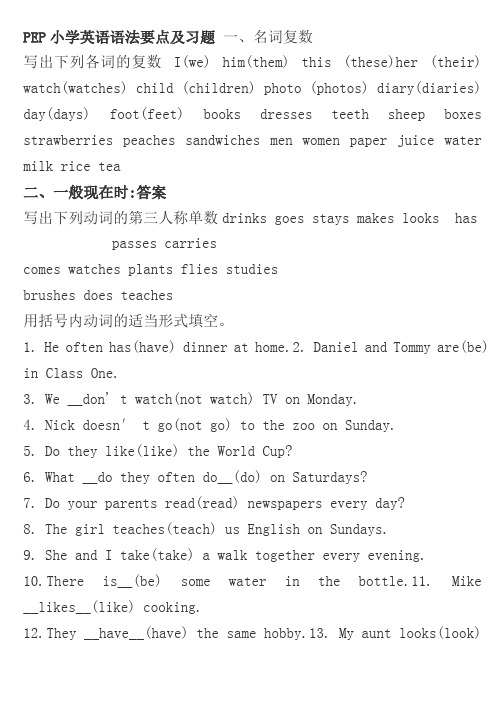
PEP小学英语语法要点及习题一、名词复数写出下列各词的复数I(we) him(them) this (these)her (their) watch(watches) child (children) photo (photos) diary(diaries) day(days) foot(feet) books dresses teeth sheep boxes strawberries peaches sandwiches men women paper juice water milk rice tea二、一般现在时:答案写出下列动词的第三人称单数drinks goes stays makes looks has passes carriescomes watches plants flies studiesbrushes does teaches用括号内动词的适当形式填空。
1. He often has(have) dinner at home.2. Daniel and Tommy are(be) in Class One.3.We __don' t watch(not watch) TV on Monday.4.Nick doesn′ t go(not go) to the zoo on Sunday.5.Do they like(like) the World Cup?6.What __do they often do__(do) on Saturdays?7.Do your parents read(read) newspapers every day?8.The girl teaches(teach) us English on Sundays.9.She and I take(take) a walk together every evening.10.T here is__(be) some water in the bottle.11. Mike __likes__(like) cooking.12.T hey __have__(have) the same hobby.13. My aunt looks(look)after her baby carefully.14.Y ou always __do(do) your homework well.15. I am__(be) ill. I'm staying in bed.16.S he goes(go) to school from Monday to Friday.17. Liu Tao __does_(do) not like PE.18.T he child often watches(watch) TV in the evening.19.S u Hai and Su Yang __have__(have) eight lessons this term.20.—What day is__(be) it today?— It's Saturday.按照要求改写句子1.Daniel doesn' t watch TV every evening.2.Do you do your homework every day? Yes, I do.3.Does she like milk? Yes, she does.4.Does Amy like playing computer games? No, she doesn' t.5.We don' t go to school every morning.6.He doesn' t speak English very well.7.What do you like in the park.8.John comes from Canada.(对划线部分提问)9.She is always a good student. 改为一般疑问句,作否定回答)10.S imon and Daniel like going skating.(改为否定句) 改错(划出错误的地方,将正确的写在横线上)English?_________________ 2.Does he likes going fishing?_________________ 3.He likes play games after class._________________ 4.Mr. Wu teachs us English._________________ 5. She don't do her homework on Sundays.二、现在进行时:写出下列动词的现在分词:play ___ run _____ s wim _____ m akego like write ski read __ have_ sing __ dance_ __ put __ __ see __ __ buy ___ ___ lovelive take come get stop sitbegin shop用所给的动词的正确形式填空:1 .The boy( draw)a picture now.2 . Listen . Some girls( sing)in the classroom .3 . My mother( cook )some nice food now.4 . What you( do ) now?5 . Look . They( have) an English lesson .6 .They(not , water) the flowers now.1. Is your brother speak7.Look! the girls(dance )in the classroom .8.What is our granddaughter doing? She (listen ) tomusic.9. It's 5 o'clock now. We (have)supper now10.Helen(wash )clothes? Yes ,she is .句型转换:1.They are doing housework .(分别改成一般疑问句和否定句)2.The students are cleaning the classroom .(改一般疑问句并作肯定和否定回答)3.I’m playing the football in the playground .(对划线部分进行提问)4. Tom is reading books in his study .(对划线部分进行提问)四、一般将来时:填空。
- 1、下载文档前请自行甄别文档内容的完整性,平台不提供额外的编辑、内容补充、找答案等附加服务。
- 2、"仅部分预览"的文档,不可在线预览部分如存在完整性等问题,可反馈申请退款(可完整预览的文档不适用该条件!)。
- 3、如文档侵犯您的权益,请联系客服反馈,我们会尽快为您处理(人工客服工作时间:9:00-18:30)。
小学英语六年级总复习语法及练习题(一)一.名词复数规则1.一般情况下.直接加-s.如;book-books, bag-bags, cat-cats, bed-beds2.以s. x. sh. ch结尾.加-es.如;bus-buses, box-boxes, brush-brushes, watch-watches3.以“辅音字母+y”结尾.变y为i, 再加-es.如;family-families, strawberry-strawberries4.以“f或fe”结尾.变f或fe为v, 再加-es.如;knife-knives5.不规则名词复数;man-men, woman-women, policeman-policemen, policewoman-policewomen, mouse-micechild-childrenfoot-feet,.tooth-teethfish-fish, people-people, Chinese-Chinese, Japanese-Japanese写出下列各词的复数I _________him _________this ___________her ______watch _______child _______photo ________diary ______day________ foot________ book_______ dress ________tooth_______ sheep ______box_______ strawberry _____thief _______yo-yo ______ peach______ sandwich ______man______ woman_______ paper_______ juice___________water________ milk________ rice__________ tea__________二.一般现在时一般现在时基本用法介绍[No. 1]一般现在时的功能1.表示事物或人物的特征.状态。
如;The sky is blue.天空是蓝色的。
2.表示经常性或习惯性的动作。
如;I get up at six every day.我每天六点起床。
3.表示客观现实。
如;The earth goes around the sun.地球绕着太阳转。
一般现在时的构成1. be动词;主语+be(am,is,are)+其它。
如;I am a boy.我是一个男孩。
2.行为动词;主语+行为动词(+其它)。
如;We study English.我们学习英语。
当主语为第三人称单数(he, she,it)时.要在动词后加"-s"或"-es"。
如;Mary likes Chinese.玛丽喜欢汉语。
一般现在时的变化1. be动词的变化。
否定句;主语+ be + not +其它。
如;He is not a worker.他不是工人。
一般疑问句;Be +主语+其它。
如;-Are you a student?-Yes. I am. / No, I'm not.特殊疑问句;疑问词+一般疑问句。
如;Where is my bike?2.行为动词的变化。
否定句;主语+ don't( doesn't ) +动词原形(+其它)。
如;I don't like bread.当主语为第三人称单数时.要用doesn't构成否定句。
如;He doesn't often play.一般疑问句;Do( Does ) +主语+动词原形+其它。
如;- Do you often play football?- Yes, I do. / No, I don't.当主语为第三人称单数时.要用does构成一般疑问句。
如;- Does she go to work by bike?- Yes, she does. / No, she doesn't.特殊疑问句;疑问词+一般疑问句。
如;How does your father go to work?动词+s的变化规则1.一般情况下.直接加-s.如;cook-cooks, milk-milks2.以s. x. sh. ch. o结尾.加-es.如;guess-guesses, wash-washes, watch-watches, go-goes3.以“辅音字母+y”结尾.变y为i, 再加-es.如;study-studies一般现在时用法专练:一. 写出下列动词的第三人称单数drink ________ go _______ stay ________ make ________look _________ have_______ pass_______ carry _____ plant_______ fly ________study_______ brush________ do_________ teach_______二.用括号内动词的适当形式填空。
1. He often ________(have) dinner at home.2. Daniel and Tommy _______(be) in Class One.3. We _______(not watch) TV on Monday.4. Nick _______(not go) to the zoo on Sunday.5. ______ they ________(like) the World Cup?6. What _______they often _______(do) on Saturdays?7. _______ your parents _______(read) newspapers every day?8. The girl _______(teach) us English on Sundays.9. She and I ________(take) a walk together every evening.10. There ________(be) some water in the bottle.11. Mike _______(like) cooking.12. They _______(have) the same hobby.13. My aunt _______(look) after her baby carefully.14. You always _______(do) your homework well.15. I _______(be) ill. I’m staying in bed.16. She _______(go) to school from Monday to Friday.17. Liu Tao _______(do) not like PE.18. The child often _______(watch) TV in the evening.19. Su Hai and Su Yang _______(have) eight lessons this term.20. -What day _______(be) it today?-It’s Saturday.三.按照要求改写句子1. Daniel watches TV every evening.(改为否定句)___________________________________________________2. I do my homework every day.(改为一般疑问句.作否定回答)________________________________________________________3. She likes milk.(改为一般疑问句.作肯定回答)______________________________________________________________________________5. We go to school every morning.(改为否定句)_______________________________________________________6. He speaks English very well.(改为否定句)___________________________________________________7. I like taking photos in the park.(对划线部分提问)___________________________________________________________________________________________________________9. She is always a good student.(改为一般疑问句.作否定回答)________________________________________________________10. Simon and Daniel like going skating.(改为否定句)___________________________________________________五.改错(划出错误的地方.将正确的写在横线上)1. Is your brother speak English? __________________2. Does he likes going fishing? __________________3. He likes play games after class. __________________4. Mr. Wu teachs usEnglish. __________________5. She don’t do her homework on Sundays. _________________三.现在进行时1.现在进行时表示现在正在进行或发生的动作.也可表示当前一段时间内的活动或现阶段正在进行的动作。
2.现在进行时的肯定句基本结构为be+动词ing.3.现在进行时的否定句在be后加not。
4.现在进行时的一般疑问句把be动词调到句首。
5.现在进行时的特殊疑问的基本结构为;疑问词不达意 + be + 主语 + 动词ing?但疑问词当主语时其结构为;疑问词不达意 + be + 动词ing?动词加ing的变化规则1.一般情况下.直接加ing.如;cook-cooking2.以不发音的e结尾.去e加ing.如;make-making, taste-tasting3.如果末尾是一个元音字母和一个辅音字母.双写末尾的辅音字母.再加ing.如;run-running, stop-stopping现在进行时专项练习;一.写出下列动词的现在分词;play________ run__________ swim _________make__________go_________ like________ write________ _ski___________read________ have_________ sing ________ dance_________put_________ see________ buy _________ love____________stop_________ sit ________ begin________ shop___________二.用所给的动词的正确形式填空;1.The boy __________________ ( draw)a picture now.2. Listen .Some girls _______________ ( sing)in the classroom .3. My mother _________________ ( cook )some nice food now.4. What _____ you ______ ( do ) now?5. Look . They _______________( have) an English lesson .6.They ____________(not ,water) the flowers now.7.Look! the girls ________________(dance )in the classroom .8.What is our granddaughter doing? She _________(listen ) to music.9. It’s 5 o’clock now. We _____________(have)supper now10.______Helen____________(wash )clothes? Yes ,she is .三.句型转换;1. They are doing housework .(分别改成一般疑问句和否定句)__________________________________________________________________________________________________________________________2.The students are cleaning the classroom . ( 改一般疑问句并作肯定和否定回答)__________________________________________________________________________________________________________________________________3.I’m playing the football in the playground .(对划线部分进行提问)_________________________________________________________________4.Tom is reading books in his study . (对划线部分进行提问)四.将来时理论及练习一.概念;表示将要发生的动作或存在的状态及打算.计划或准备做某事。
